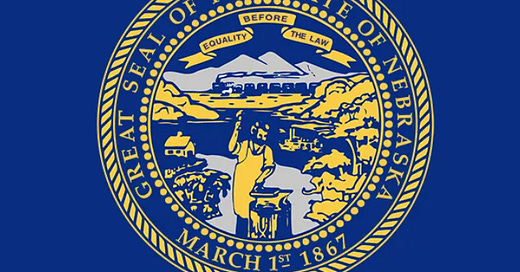Nebraska passes abortion ban
An antiabortion amendment was attached to one limiting gender-affirming care
Nebraska’s abortion rights movement suffered a setback this week after lawmakers there attached an antiabortion amendment to an anti-trans bill they passed in a constitutionally questionable way.
The ban will limit abortions after 12 weeks, as well as any gender-affirming care for people under the age of 19. Activists in the state had sought to clarify that abortion hadn’t had anything to do with gender-affirming care and that it should be legislated separately.
Previously, conservative state lawmakers had wanted to pass a six-week abortion ban that was defeated.
The amendment was added in haste. It has an emergency clause so it goes into effect immediately upon signature and the hospital systems are not ready for the practice pattern changes to emerge. The bill has ambiguities that place healthcare providers in a tough spot, now having to consider the legal interpretation of management decisions that are currently standards of care when counseling patients.
Antiabortion lawmakers argued that fetuses were also children who needed protection as well. At the core of that argument is the belief in fetal personhood, which has never been recognized in American jurisprudence. Any amendment to a Nebraska law has to be related to whatever topic or field the statute will regulate.
“But this amendment that they put in was an abortion ban on top of that transgender bill,” said Stephanie Gustin, an OB/GYN in the state.
“And the people who introduced it are saying that it's germane because the initial bill was entitled something that transgender people was entitled something like, “let them grow and be” (and they said) the abortion bill was about letting unborn children grow.”
In other states I’ve reported on, activists have sought to clarify that abortion rights are a separate issue from gender-affirming care. Plausibly–and this is my point and not someone in this article–that may have to do with the added difficulty in advocating for an already inflammatory position by combining it with something that makes people additionally uncomfortable.
That may be a division that is emerging within the abortion rights movement as activists in staunchly Democratic states like New York and California tie both of those issues together while those who are fighting in conservative states want them to be fought for separately to make it easier to protect abortion access. That isn’t to say that grassroots activists in places like Wisconsin, Nebraska, or Texas don’t want protections for transgender people. It’s just that they’re confronted with harsher political realities that force practical decisions.
Gustin said the bill was an attack on both abortion and trans rights and criticized both actions. Her organization, Doctors for Fertility, compiled 1,300 signatures to oppose this bill.
“It has a pretty profound impact,” Dr. Gustin said. “I know that there are a lot of family medicine doctors who provide OB-GYN care in the state who stated that if this abortion ban went into effect that they would probably not provide OB-GYN care for patients, which just exacerbates the health care deserts that already exist in Nebraska.”




